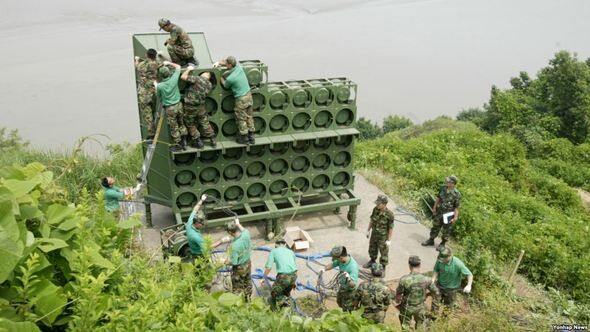hankyoreh
Links to other country sites 다른 나라 사이트 링크
Pres. Park comes out with harsher criticism of N. Korea for mine attack

On Aug. 17, South Korean President Park Geun-hye denounced mines that exploded in the DMZ as a “deadly provocation” by North Korea. Her criticism of the mine attack was much sharper than it had been in the address she delivered on Liberation Day, Aug. 15.
With North Korea continuing its criticism of Park for the second day and resuming propaganda broadcasts over loudspeakers, tension between North and South Korea is continuing.
On Monday - the first day of the Ulchi-Freedom Guardian (UFG) joint military drills for American and South Korean forces - President Park presided over a cabinet meeting at the Blue House and said, “North Korea’s landmine provocation in the DMZ was a clear military provocation in which North Korean forces illegally crossed the military demarcation line and attempted to slaughter South Korean troops.”
Park also rebutted North Korea’s criticism of the drills by emphasizing that “the Ulchi drills are routine exercises that have taken place every year since North Korea‘s commando raid on the Blue House in 1968 [during the presidency of Park Chung-hee].”
During Park’s Liberation Day address on Aug. 15, she called for stern measures, declaring that “North Korea’s landmine provocation has trampled the desires of the Korean people,” while also reiterating the need for inter-Korean exchange. “If North Korea walks down the path of dialogue and cooperation it can seize an opportunity for developing its economy and improving its people’s quality of life,” Park said during the speech.
When asked about Park‘s announcement of a much tougher response on Monday, only two days after her Liberation Day address, a Blue House spokesperson said, “Since the Ulchi drills themselves are an exercise intended to help us prepare for North Korean provocations, Park was only emphasizing that we need to always be thoroughly prepared, even under normal conditions. The position toward North Korea described in Park’s Liberation Day address remains unchanged.”
North Korea’s criticism of President Park also extended into the second day, after beginning on Aug. 16, the day after her Liberation Day speech.
On Monday, three essays bashing President Park were posted on Uriminzokkiri, the website of North Korea’s Committee for the Peaceful Reunification of the Fatherland. “Park Geun-hye concocted the landmine explosion incident, bringing to naught the efforts and desires of the entire Korean people to make Aug. 15 a superb time to bring about inter-Korean reconciliation and national unity,” one of the essays said.
North Korea also attacked Park on Aug. 16. A statement by the spokesperson for the Committee for the Peaceful Reunification of the Fatherland said, “Park Geun-hye spread vicious rumors about us in her Liberation Day speech, of all places.”
Experts expect that the strained relations between North and South Korea will continue for some time.
“The Ulchi drills are going to last until the end of August, and there isn‘t enough time to hold the reunions of divided families during Chuseok [Korea’s Harvest Festival]. There aren’t any obvious opportunities to improve inter-Korean relations,” said Koh Yu-hwan, a professor of North Korean studies at Dongguk University.
“Since North Korea immediately dismissed Park’s proposal for dialogue, she seems to be focusing on security with the political goal of increasing her approval at home. I don’t think that inter-Korean relations are going to improve while Park is in office,” said Yang Moo-jin, a professor at the University of North Korean Studies.
By Kim Ji-hoon and Choi Hye-jung, staff reporters
Please direct questions or comments to [english@hani.co.kr]

Editorial・opinion
![[Column] Park Geun-hye déjà vu in Yoon Suk-yeol [Column] Park Geun-hye déjà vu in Yoon Suk-yeol](https://flexible.img.hani.co.kr/flexible/normal/500/300/imgdb/original/2024/0424/651713945113788.jpg) [Column] Park Geun-hye déjà vu in Yoon Suk-yeol
[Column] Park Geun-hye déjà vu in Yoon Suk-yeol![[Editorial] New weight of N. Korea’s nuclear threats makes dialogue all the more urgent [Editorial] New weight of N. Korea’s nuclear threats makes dialogue all the more urgent](https://flexible.img.hani.co.kr/flexible/normal/500/300/imgdb/original/2024/0424/7317139454662664.jpg) [Editorial] New weight of N. Korea’s nuclear threats makes dialogue all the more urgent
[Editorial] New weight of N. Korea’s nuclear threats makes dialogue all the more urgent- [Guest essay] The real reason Korea’s new right wants to dub Rhee a founding father
- [Column] ‘Choson’: Is it time we start referring to N. Korea in its own terms?
- [Editorial] Japan’s rewriting of history with Korea has gone too far
- [Column] The president’s questionable capacity for dialogue
- [Column] Are chaebol firms just pizza pies for families to divvy up as they please?
- [Column] Has Korea, too, crossed the Rubicon on China?
- [Correspondent’s column] In Japan’s alliance with US, echoes of its past alliances with UK
- [Editorial] Does Yoon think the Korean public is wrong?
Most viewed articles
- 1‘We must say no’: Seoul defense chief on Korean, USFK involvement in hypothetical Taiwan crisis
- 2N. Korean delegation’s trip to Iran shows how Pyongyang is leveraging ties with Moscow
- 3Amnesty notes ‘erosion’ of freedom of expression in Korea in annual human rights report
- 4[Column] Park Geun-hye déjà vu in Yoon Suk-yeol
- 5‘Weddingflation’ breaks the bank for Korean couples-to-be
- 6[Reportage] On US campuses, student risk arrest as they call for divestment from Israel
- 7[Editorial] New weight of N. Korea’s nuclear threats makes dialogue all the more urgent
- 8Why Korea shouldn’t welcome Japan’s newly beefed up defense cooperation with US
- 9[Guest essay] The real reason Korea’s new right wants to dub Rhee a founding father
- 10Will NewJeans end up collateral damage in internal feud at K-pop juggernaut Hybe?